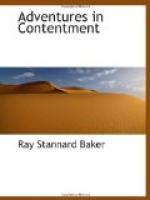“It seems strange to you,” he said, “but I am telling you exactly what my experience was.”
It was curious, he said, when his father told him he must not do a thing, how he went on and imagined in how many different ways he could do it—and how, afterward, he imagined he was punished by that “worm,” his father, whom he seemed to hate bitterly. Of those early days, in which he suffered acutely—in idleness, apparently—and perhaps that was one of the causes of his disorder—he told us at length, but many of the incidents were so evidently worn by the constant handling of his mind that they gave no clear impression.
Finally, he ran away from home, he said. At first he found that a wholly new place and new people took him out of himself ("surprised me,” he said, “so that I could not live everything beforehand"). Thus he fled. The slang he used, “chased himself all over the country,” seemed peculiarly expressive. He had been in foreign countries; he had herded sheep in Australia (so he said), and certainly from his knowledge of the country he had wandered with the gamboleros of South America; he had gone for gold to Alaska, and worked in the lumber camps of the Pacific Northwest. But he could not escape, he said. In a short time he was no longer “surprised.” His account of his travels, while fragmentary, had a peculiar vividness. He saw what he described, and he saw it so plainly that his mind ran off into curious details that made his words strike sometimes like flashes of lightning. A strange and wonderful mind—uncontrolled. How that man needed the discipline of common work!
I have rarely listened to a story with such rapt interest. It was not only what he said, nor how he said it, but how he let me see the strange workings of his mind. It was continuously a story of a story. When his voice finally died down I drew a long breath and was astonished to perceive that it was nearly midnight—and Harriet speechless with her emotions. For a moment he sat quiet and then burst out:
“I cannot get away: I cannot escape,” and the veritable look of some trapped creature came into his eyes, fear so abject that I reached over and laid my hand on his arm:
“Friend,” I said, “stop here. We have a good country. You have travelled far enough. I know from experience what a cornfield will do for a man.”
“I have lived all sorts of life,” he continued as if he had not heard a word I said, “and I have lived it all twice, and I am afraid.”
“Face it,” I said, gripping his arm, longing for some power to “blow grit into him.”
“Face it!” he exclaimed, “don’t you suppose I have tried. If I could do a thing—anything—a few times without thinking—once would be enough—I might be all right. I should be all right.”
He brought his fist down on the table, and there was a note of resolution in his voice. I moved my chair nearer to him, feeling as though I were saving an immortal soul from destruction. I told him of our life, how the quiet and the work of it would solve his problems. I sketched with enthusiasm my own experience and I planned swiftly how he could live, absorbed in simple work—and in books.




